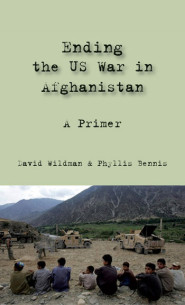Ideas into movement
Boost TNI's work
50 years. Hundreds of social struggles. Countless ideas turned into movement.
Support us as we celebrate our 50th anniversary in 2024.

In this compact, concise, jargon-free primer, the authors examine the U.S. war in Afghanistan and why it must be brought to an end.

“We’re poor people! Don’t destroy our country just to get one man…”
—Afghan refugee in an interview on National Public Radio, September 30, 2001
“If we rush to launch a counterattack, we run too great a risk that women, children, and other noncombatants will be caught in the crossfire. Nor can we let our justified anger over these outrageous acts inflame prejudice against all Arab Americans, Muslims, Southeast Asians, or any other people because of their race, religion, or ethnicity. Finally we must be careful not to embark on an open-ended war with neither an exit strategy nor a focused target. We cannot repeat past mistakes.”
—U.S. Representative Barbara Lee, September 15, 2001 upon casting the lone dissenting vote for the authorization to use force
The Bush administration answered the terror attacks of September 11, 2001 with what it called the “global war on terror,” beginning with the assault and invasion of Afghanistan and then with the invasion and occupation of Iraq. As more and more Americans joined the opposition to the Iraq war, for many, Afghanistan remained “the good war.” But was Afghanistan ever a “good war”? And will President Obama’s plan and escalation of US troop presence in Afghanistan work?
In this easy-to-read volume of “frequently asked questions” (FAQs), analysts David Wildman and Phyllis Bennis examine a wide range of key issues regarding the U.S. war in Afghanistan. Is Afghanistan really going to become “Obama’s war”? What was the history of the U.S. in Afghanistan before September 11? What role does NATO play in the Afghanistan war? Do Afghans want the U.S. troops to stay in their country? Who are the Taliban? What is al-Qaeda? And, finally, what are the steps needed to end the war?
In this compact, concise, jargon-free primer, the deeply knowledgeable authors answer all the basic questions and explain the various aspects of the war in Afghanistan.
Book excerpt:
"The people and government of Afghanistan never represented a threat to the U.S. The Taliban emerged as one group of Islamist guerrillas among many, during the inter-mujahideen or inter-Islamist war that followed the withdrawal of Soviet troops in 1989. Its government was harshly repressive, brutally cruel for Afghanistan's women in particular. But the Taliban's goals were always focused on controlling Afghanistan - they never embarked on a global crusade or identified global enemies. They fought - and fight - the U.S. and NATO because those soldiers are occupying their country.
The 2009 memo drafted by Col. Timothy R. Reese, one of the top U.S. military advisers in Baghdad, and leaked to the New York Times, described a situation in Iraq that applies directly to Afghanistan: "Our combat operations are currently the victim of circular logic. We conduct operations to kill or capture violent extremists of all types to protect the Iraqi people and support the Government of Iraq. The violent extremists attack us because we are still here conducting military operations." Substitute "Afghanistan" and "Afghans" for Iraq and Iraqis, and Col. Reese's analysis is spot on. Reese's memo was titled, "It's Time for the U.S. to Declare Victory and Go Home."
Paul Pillar was deputy chief of the CIA's counter-terrorism center from 1997-1999. Writing in the Washington Post in September 2009 he challenged the common assumption that the Taliban must be destroyed because they might provide safe haven to al Qaeda. "How important to terrorist groups is any physical haven?" he asked. "More to the point, how much does a haven affect the danger of terrorist attacks against U.S. interests, especially the U.S. homeland? The answer to the second question is: not nearly as much as unstated assumptions underlying the current debate seem to suppose." Reminding the world of the limited value of terrorist training camps and permanent bases, Pillar wrote, "When a group has a haven, it will use it for such purposes as basic training of recruits. But the operations most important to future terrorist attacks do not need such a home, and few recruits are required for even very deadly terrorism. Consider: The preparations most important to the Sept. 11, 2001 attacks took place not in training camps in Afghanistan but, rather, in apartments in Germany, hotel rooms in Spain and flight schools in the United States."
Ultimately, even those who still insist the Taliban must be eliminated have to recognize that sending huge U.S. and NATO deployments to attempt to seek out and destroy the Taliban in Afghanistan is simply not going to work. To the contrary, as Gilles Dorronso, top analyst for the Carnegie Endowment for International Peace, has described, "the presence of foreign troops is the most important element driving the resurgence of the Taliban."
David Wildman is Executive Secretary for Human Rights and Racial Justice with the General Board of Global Ministries, United Methodist Church. He has regional responsibilities relating to the Middle East and Afghanistan and has in recent years traveled to Afghanistan four times.
Pages: 144